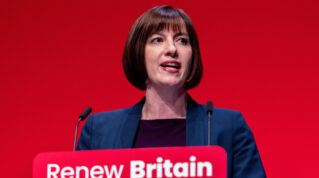The NASUWT teaching union would formally ballot members for industrial action if the government defies a formal recommendation of a higher pay rise from September, its outgoing leader has said.
Members will also tomorrow debate an urgent motion at their annual conference mandating the union to “reject any pay award that is not fully-funded and to move immediately to ballot members for industrial action”.
Dr Patrick Roach told Schools Week the union “would go straight to our members” if the Labour government chose to ignore the advice of the school teachers’ review body if it recommends an increase above the 2.8 per cent proposed by ministers.
His comments set a second union on a collision course with government, after the National Education Union voted to move to a formal ballot if the pay review process results in an “unacceptable” offer.
The STRB makes recommendations on teacher pay to ministers each year. It is allowed to exceed any remit set for it by government, but ministers are allowed to ignore its advice, something that last happened in 2019.
In its evidence to the STRB last year, the Department for Education said 2.8 per cent pay rise “would be appropriate” for 2025-26, adding that schools would need to find “efficiencies” to fund some of the increase.
However, the DfE has since admitted schools will be able to afford less than half of the 2.8 per cent pay rise proposed for next year, despite the increase in funding announced at last autumn’s budget.
Wage growth in the wider economy is set to hit 3.7 per cent this year.
‘We wouldn’t be messing around’
Speaking to Schools Week at NASUWT’s conference in Liverpool today, Roach, who will step down at the end of this month, said it would be a “non-starter” for the Labour government to defy calls from the STRB for a rise above 2.8 per cent.
“We would go straight to our members. We wouldn’t be messing around. I’m sure of that. I know what the will of our national action committee is, and that isn’t changing, whether I’m here or somebody else is in my seat.

“The will of the national action committee is you’d put that straight to members and say, what do you want to do about it, in a formal ballot.”
Asked if he anticipated this would be a ballot for industrial action, Roach said: “I would expect that.”
Roach said he had told education secretary Bridget Phillipson when the 2.8 per cent rise was proposed last year that “I didn’t think this was a clever strategy to be taking.
He said he raised concerns the announcement “would lead to premature actions on the part of school employers, saying we’re going to have to tighten our belts, because come September, we know what’s coming, and we can’t afford it.
“I hope that ministers have taken on board what we’ve said to them.”
He also criticised what he described as a “new phenomenon” of the government effectively seeking to constrain the STRB by setting out the level of pay it feels is appropriate.
“The evidence, actually, from the last two review body reports, is that the review body take what the government is saying with the pinch of salt.”
Profession ‘well-served’ by pay review body
The STRB recommended a 6.5 per cent rise in 2023, when the government had pushed for 3 per cent. It then recommended another 5.5 per cent rise last year. Both were accepted by ministers.
“Sometimes it’s not the most populist line to take,” said Roach.
“But the profession’s not being badly served, in fact it’s probably been well served by an independent pay review body. Let’s keep an independent pay review body process that’s prepared to speak up and speak out for the profession.”
In his final speech as NASUWT general secretary, Roach this morning took a parting shot at a government he has been a vocal supporter of since its election last year.
He praised ministers for last year’s pay award, the formation of the Improving Education Together partnership with unions, employment rights reforms and the children’s wellbeing and schools bill.
“But despite some progress, we cannot pretend that the last nine months have been easy or comfortable,” he told delegates, adding that government “has a responsibility to give people hope, dignity and the belief that things will get better”.
Government must ‘make the right choice’ on poverty
He pointed to cuts to winter fuel payments and support for disabled people, adding that “this government, more than any other should understand that you don’t provide hope by making life worse for those who are the most vulnerable in our society.
“And, what about the two-child benefit cap? Conference, this is a nasty, spiteful, vindictive and discriminatory policy introduced by the previous Conservative government.
“And as long as the two-child policy continues to be in place, the lives and futures of hundreds of thousands more children will be damaged unnecessarily.”
He described poverty as a “political choice”, and urged government to “make the right choice.
“Remove the two-child benefit cap. Turn the page. Deliver the change the country voted for. And lift more children and more young people out of a life of poverty.”
The full text of the urgent motion
Conference condemns the policies of austerity pursued by the Conservative-led Westminster Government between 2010 and 2024 which have resulted in a profound crisis affecting all public services and the staff who work in them.
Conference notes with serious concern the harm caused by more than a decade of substantial real-terms cuts which continue to impact adversely on children’s life chances and on the living standards, morale and wellbeing of teachers.
Conference asserts that at the 2024 General Election, the country voted for real change and to ending the policies of economic austerity.
Conference is deeply dismayed by the Westminster Government’s decision to cut financial support for vulnerable people, including the elderly and disabled, whilst sticking doggedly to damaging fiscal rules agreed prior to the General Election.
Conference further asserts that real-terms cuts to spending on our public services and welfare system will inevitably reduce opportunity for our children and young people, further damaging life chances, and hit the poorest hardest.
Conference condemns those individuals and organisations that continue to exploit public services for profit.
‘Reject damaging and regressive fiscal rules’
Conference calls on the Westminster Government to use the 2025 Spending Review to reject the pursuit of damaging and regressive fiscal rules and instead prioritise
- real-terms investment in our public services and welfare state;
- fully funding our public services to ensure that schools, colleges and other frontline services can recruit and retain the staff needed to deliver the high-quality services that the public expects;
- removing the opportunities for CEOs and corporations to exploit our public services for profit and to line their own pockets;
- cracking down on tax avoidance and tax evasion and
- implementing a progressive programme of wealth taxes to ensure that those with the broadest shoulders pay the most
Conference further calls on the National Executive to step up its campaigning to secure fully funded real-terms pay awards for all teachers in 2025-26.
Conference mandates the National Action Committee to reject any pay award that is not fully funded and to move immediately to ballot members for industrial action.
















Good, about time the NASUWT discovered its backbone.